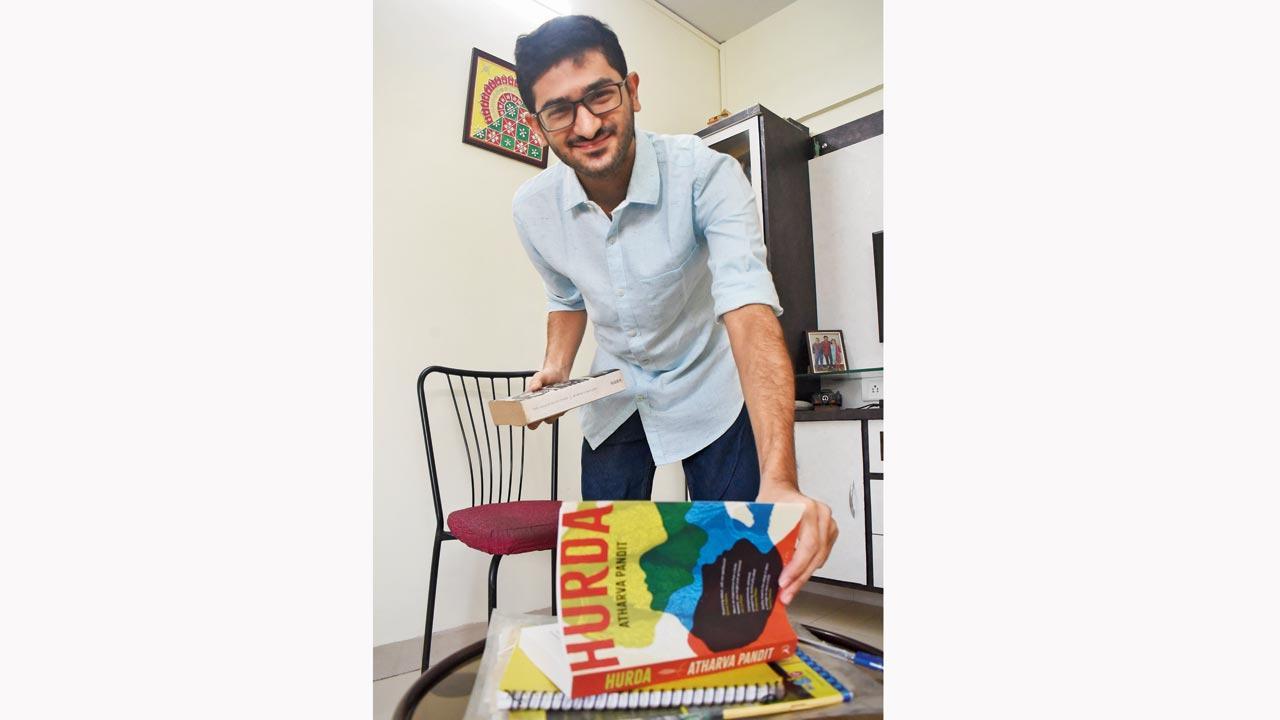In painting a portrait of a Maharashtra village, Atharva Pandit’s debut novel Hurda lays bare the consequences of India’s grim misogyny

I’ve always been fascinated by novels that experiment with form and teem with characters, says Pandit. Pic/Sameer Markande
Hurda, or tender green sorghum, is cherished in Maharashtra in the winter months when it is harvested and eaten freshly roasted. Hurda parties—where the sweet millet is savoured alongside banter and barbeque fires—are cherished too, especially by city residents seeking an ‘organic’ rural experience.
ADVERTISEMENT
In journalist Atharva Pandit’s hands, the hurda party is a plot point that perplexes the characters of his debut novel named after the millet (Bloomsbury Publishing/ Bloomsbury India), set in the fictional village of Murwani. Here, the authorities’ urge to solve a crime, and the fellow villagers’ empathy towards the family affected by it, is no match to the years of grief it spawns.
Pandit’s haunting story of the aftermath of the rape and murder of three young girls, has occupied his mind for a decade. At 16, when he began to take an interest in news, he was roused by a veteran reporter’s sensitive investigation of a similar case in Maharashtra’s Bhandara village. “I still have a cut-out of the two-page spread,” he says. “I couldn’t stop thinking about the case for days. I remember being sleepless and wondering how someone could do this to children. There’s something deeply wrong with us as a society if we can’t be empathetic towards young girls.”
His single-minded focus to write a novel about the misogyny that allows gruesome gendered crimes to occur and be forgotten, compelled him to visit Bhandara a few years later; by this point, the Andheri resident had already attempted to write a draft. Pandit’s novel is a lesson in giving oneself the benefit of age and experience to do a job well, particularly when the subject commands it. “I thought writing about the series of events was the best way to understand them. In 2013 I was naive, but in later years, I realised that the telling of such a story must come from a genuine place—to truly know why the crime happened, and why crimes like these continue occur,” he says.
The novel in its current form was born when Pandit, 27, pursued the South Asia Speaks fellowship and was mentored by author Prayaag Akbar. Murwani’s world is a well-etched one which gives the reader a deep look into each character and their motivations—from a police officer who is adept at shooting stones to make the fruit fall from mango trees, to the mid-day meal cook at a local school who has come to terms with her own fate in the village, but hopes its girls will find better futures.
Pandit presents the everyday misogyny that women encounter, the markers of masculinity that men boast of or fail to possess, and the patriarchal outlook that permits the villagers to fixate on 14-year-old girls—from their choice of clothing to the ways in which they attracted the wrong kind of attention. Against this backdrop, it is hardly surprising that a single mother—a widow whose husband dies of an illness—is accused of black magic, murder and allowing her daughters to stray. “I’ve noticed people speak of village life in two distinctive ways—the nostalgia and simplicity of it, or its wild and untamed side. Chitranshu, the reporter from Mumbai who visits Murwani to cover the story and who may be expected to be decent or respectful, exhibits the same misogyny that we see in the village. I wanted to capture how men in urban and rural settings tend to perceive young girls and women the same way,” the author explains.
It is Pandit’s style that draws the reader in, especially the sections written like a reporter’s transcriptions, which convey the overwhelming conjecture and gossip around the girls’ deaths—supplied even by those individuals who knew little about them. He uses repetition to great effect, repeating words to bring emphasis to the details that matter, in a story where the search for truth and fact makes no progress. The author infuses the characters’ lines—particularly their more emotional disclosures— with Marathi phrases.
“I’ve always been fascinated by novels teeming with characters, such as Roberto Bolaño’s The Savage Detectives or Marlon James’ A Brief History of Seven Killings. The Gypsy Goddess by Meena Kandasamy brilliantly plays with form. I attempted to experiment similarly. I also wanted to see how Marathi and English could be fused such that it sounds like the English spoken by Maharashtrian characters, through voice and tonal shifts,” Pandit says.
Pandit evolved across drafts, but he was certain from the start that the novel should be titled Hurda. A poetic choice, given hurda’s significance in the plot, but also the evocation of a tender crop harvested early in its life cycle—the wiping out of a life that was yet to be lived.
 Subscribe today by clicking the link and stay updated with the latest news!" Click here!
Subscribe today by clicking the link and stay updated with the latest news!" Click here!







